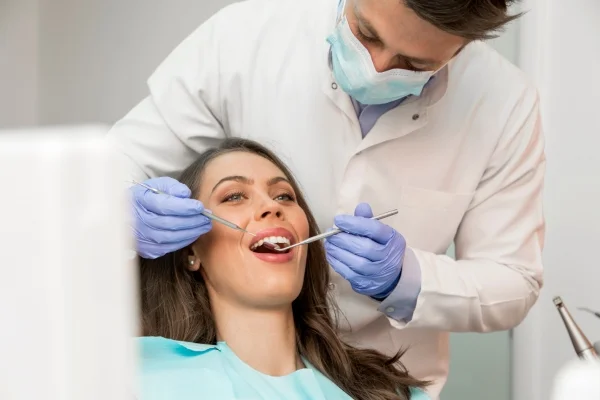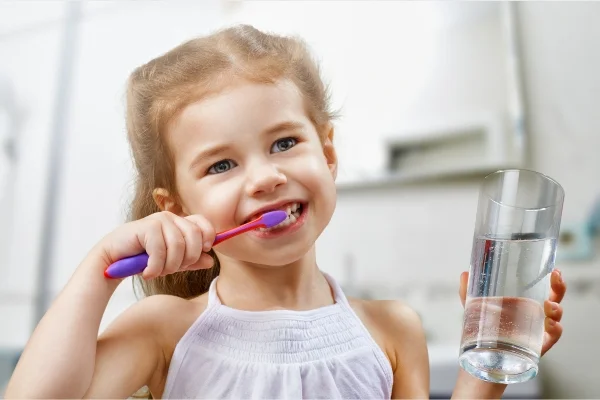Keeping our kids’ teeth healthy is important for their health. Cavities are a big problem, but they don’t have to be. If we take good care of our teeth every day, we can help them avoid those trips to the dentist when in pain.
Plus, most importantly, good habits will make sure they have strong and healthy teeth as they grow up. In this blog, we are going to go over seven easy tips that can help us keep our children’s teeth clean and cavity-free for a lifetime.
1. Make Brushing Fun

We get it that brushing isn’t the most fun activity for kids, especially when there is a mountain of things they would rather be doing. However, when it is fun, they will hardly resist the need to do it every day. One good way of doing this is to let your child choose their toothbrush.
There are so many that come with cartoon characters that are attractive and they have bright colors which makes brushing fun. We can even choose a flavored toothpaste that they prefer, some can be bubble-gum flavored, or even fruity.
Another way to brush your teeth is by singing a song or even setting a timer. There are some practices that the dentist advises, which include telling our child that brushing should be done, however, instead of saying it’s best to do it in front of them. If we can brush while singing or dancing to a song, the kids will not resist brushing their teeth. It’ll turn into a fun activity.
The Two Minutes Rule with Toothbrushing
So many people think they spend 2 minutes or longer to brush, but in reality, they can hardly pass 30 seconds. The longer we brush, the more plaque we remove. Plaque is the sticky stuff that can cause cavities. Getting rid of plaque is possible by brushing two minutes twice a day every day and helps keep our child’s teeth safe from decay.
2. Don’t Forget to Floss
It is important to brush our teeth, but it often fails to clean them completely. Or it misses areas between the teeth. This is where flossing plays a role. Flossing clears the food and the plaque that may be trapped between your teeth. Cavities can develop in between those teeth, and this is why it is important to teach our kids how to floss.
It’s important to help kids learn how to floss until they can do the work on their own.
How Often Should We Floss?
Similar to brushing, flossing should be done daily. Ideally, it should be done once a day, at night just before going to sleep. In this way, any kind of food or plaque will not remain trapped between their teeth while they are asleep.
3. Limit Sugary Snacks and Drinks
Children enjoy their sweet treats, but there is a danger that such a habit leads to cavities. Candy, cookies, and soft drinks do a lot of harm to our children’s teeth. We all know that sugar provides a favorable environment in our mouth for the growth of bacteria, which causes acid to form and destroy the enamel – the outer protective covering of teeth. That’s how cavities start.
While it is okay for children to indulge sometimes, they should not be fed many foods with high sugar amounts. Instead of sweet items, we should provide something like fruits, vegetables, and cheese which will be beneficial for health. Not only are they good for their complete physical health but their dental health as well. Some other products contain water; it is much healthier to take water rather than take sugary products in between meals. It works at cleaning the area around the mouth and removes most residuals of foods that we may take.
Smart Snack Choices
Raw foods such as apples, carrots, and celery are particularly good for teeth. They contribute to cleaning teeth without the need for chemicals, and they also do not contain sugar. These are good examples for our kids if they ever want a snack that is tasty and does not harm their teeth.
4. Regular Dental Check-ups Are a Must

Even though we make sure to brush, floss, and avoid too many sweets, the little ones need to visit the dentist. Cavities, gum diseases, and many other dental issues can be first identified by a dentist before they progress to more advanced stages. Also, general brushing and flossing do not allow us to remove some plaque and tartar, which a professional cleaning does for us.
Ideally, they should visit the dentist after every six months. These visits help our children familiarize themselves with dental visits, so they will not have any fear of the dentist in the future. With the help of this advertisement, we would frequent the dentist to the point that the dentist will become a norm that people maintain because they have teeth.
What Happens During a Check-up?
During a checkup, the dentist will examine and assess the condition of our child’s teeth and may polish the teeth or take dental x-rays to see what is occurring beneath the surface and will apply fluoride to the child’s teeth. They will also advise you on how we can maintain healthy teeth for the child at our own home. What can be a very ordinary visit can avoid more serious conditions at a later stage.
5. Drink More Water
One of the simplest and most effective ways of protecting your child’s teeth is to drink plenty of water. Drinking water, especially during and after a meal has the effect of rinsing foods or sugars that form a sticky surface on the teeth. Most importantly, it keeps our mouth wet and aids in the creation of saliva. Saliva plays an important role because it contains enzymes that neutralize the acid in our mouth as well as rinse away bacteria.
This is very good for teeth because instead of giving our children soda or juice to drink, they are drinking water, which is healthy for the teeth and the body. Another fact you should know is that water has no sugars that can transform into cavity-creating acids. We can succeed in getting them to drink water only and most preferentially after meals, the teeth of our children will not only be clean but also strong.
Is Tap Water Safe?
In most places, tap water contains fluoride, which is great for teeth. Fluoride helps strengthen the enamel and offers protection of the teeth from cavities. So, if we’re drinking tap water, we’re giving our child an extra boost to keep their teeth healthy!
6. Use Fluoride Toothpaste

Fluoride is a naturally occurring mineral that assists in the prevention of tooth decay. That increases the work of enamel to combat the acids that lead to tooth decay. Which is crucial to ensure our child is brushing their teeth by using fluoride toothpaste.
For children with even less understanding of personal care, only pea-sized amounts should be used for fluoride toothpaste. This is enough to clean their teeth and protect them from cavities without wastage of the item. More so, this can be in the form of toothpaste. As they grow up we can ensure that they are observing the right techniques of brushing and with the correct proportion of toothpaste.
Why Fluoride Matters
Fluoride doesn’t just make our teeth shine, but it also guards them. With every application of fluoride-containing toothpaste, the enamel of the teeth is being replenished. It’s like giving our child’s teeth a little shield so as not to get cavities.
7. Lead by Example
The primary approach to ensuring the kids develop proper dental hygiene is usually modeling through the ways we maintain our teeth. Children follow what we do; if they see us brushing and flossing daily, then they will also follow that same path we set. It can even be done and addressed as a daily practice where the entire family brushes their teeth in the morning and before going to bed.
Brushing and flossing our teeth regularly is just something that we cannot avoid. Kids will copy and imitate the things that they see us doing. They’ll begin to develop perceptions of dental health as an activity undertaken by every person to maintain healthy teeth and gums. Moreover, when we are required to go for a check-up at the dentist, we can talk about how important it is and make them comfortable attending their appointments.
Make It a Family Habit
Thus, brushing and flossing side by side will create a dental regime that our children are happy and excited to practice. We can even offer them a sticker or any other small treat (it doesn’t have to be candy) once they are done brushing for a whole week at least. This in turn makes it something one likes to do instead of something that feels like a chore.
Why Prevention Is Better Than Treatment
As everyone understands, it is much better to avoid having issues than to deal with them after some time, and this is true for decay, in particular. If a cavity is formed, then our child will require fillings which are painful and can be very costly. Following these tips, one can avoid developing cavities in the first place so that they don’t have to take fillings at all. Besides, it helps our child maintain a healthy set of teeth and also spares us from very uncomfortable dental sessions in the future.
Brushing, flossing, and eating right ensures that cavities will not be a problem. When we pay attention to prevention, our kids will have good and healthy teeth that will remain with them throughout their lifetime. And as they grow up, they’ll already know the procedures of personal hygiene and especially dental hygiene.
You Can Avoid Fillings
A simple feeling can cause some kids to get scared, and that is why we want to avoid them as much as possible. Hence, it makes a lot of sense to try and prevent cavities right from the start, if possible. Of course, even mere actions such as brushing, seeing the dentist, or flossing can all go a long way towards it.
Final Thoughts
It does not have to be a difficult thing to help our kids bid farewell to cavities. And by educating kids on fun ways in which they can maintain oral hygiene, then they will grow up with healthy teeth. From brushing their teeth together, and eating healthy to making sure that they take enough water, all these simple things eventually make a difference.
As you know, the best things that you should do are visit the dentist often, use fluoride toothpaste, and avoid eating sugary foods. If we stick to these seven tips, then our kids will have healthy teeth with no cavities and a pretty smile on their faces. If we stay consistent with these seven tips, our kids will have strong, cavity-free teeth and a bright smile to show for it!
FAQs
1. How often should children go to the dentist?
It’s recommended that kids visit the dentist every six months for a check-up and cleaning. These visits help catch any problems early.
2. How much fluoride toothpaste should children use?
For younger kids, just a pea-sized amount of fluoride toothpaste is enough. This helps clean their teeth and prevent cavities without using too much fluoride.
3. What snacks are best for my child’s teeth?
Snacks like fruits, veggies, and cheese are great choices for keeping teeth healthy. They don’t stick to teeth like sugary snacks do, and they help clean teeth naturally.
4. Is it okay if my child skips flossing?
Flossing is just as important as brushing because it cleans the teeth that a toothbrush can’t reach. Skipping flossing can leave food and plaque behind, which can lead to cavities.
